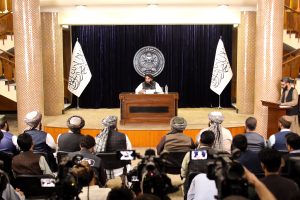Berlin – Reuters
The escalating humanitarian crisis in Gaza and Israel’s plans to expand its military control over the sector have prompted Germany to suspend arms exports to Israel, a sensitive move for Berlin driven by growing public anger.
Conservative Chancellor Friedrich Merz, who until recently was a strong supporter of Israel, announced this decision on Friday, stating that Israel’s actions will not achieve its declared war aims of eliminating Hamas or recovering Israeli hostages.
This bold step by the leader, who after winning the February elections said he would invite Benjamin Netanyahu to visit Germany despite an ICC arrest warrant against the Israeli Prime Minister, reflects how unconditional support for Israel is being tested like never before. Germany’s decades-old policies toward Israel are being affected by the rising number of Palestinian civilian casualties in Gaza, the massive destruction caused by the war, and the spread of images of hungry children.
Moriel Aspurg, a researcher at the German Institute for International and Security Affairs, said: “It is remarkable that this is the first tangible measure taken by this German government. But I do not see it as a shift in German policy but rather a ‘warning shot.'”
The decision comes after months in which Berlin has toughened its tone regarding Israel’s escalating military campaign in the densely populated Palestinian sector, yet it still avoids taking harsher steps called for by other European countries and some voices within Merz’s ruling coalition.
The suspension of arms deliveries to Israel will only affect those that can be used in Gaza.
This step reflects a sense of anger in Germany, where public opinion has become more critical of Israel amid increasing demands for the government to help alleviate the humanitarian disaster in Gaza, where most of the 2.2 million residents are displaced amid piles of rubble.
According to a Deutschland Trend poll for ARD TV released Thursday, a day before Merz announced his decision, 66% of Germans want their government to put more pressure on Israel to change its behavior.
This percentage is higher than in April 2024, when a Forsa Institute poll showed about 57% of Germans said their government should intensify its criticism of Israel due to its actions in Gaza.
Despite Germany’s contribution to air drops of aid in Gaza, 47% of Germans believe their government is not doing enough for Palestinians there, compared to 39% who disagree, according to the Deutschland Trend poll.
Perhaps most surprisingly, only 31% of Germans feel they have a greater responsibility toward Israel due to historical events—a fundamental principle in German foreign policy—while 62% do not.
The German political establishment describes its approach as a special responsibility toward Israel after the Nazi Holocaust, an approach articulated in 2008 by then-Chancellor Angela Merkel before the Israeli Knesset. Reflecting this entrenched approach, German Foreign Minister Johann Wadephul told Die Zeit newspaper days before his July trip to Israel that Berlin cannot be a “neutral mediator.”
He added: “Because we are biased. We support Israel,” echoing similar positions of other conservative figures in Merz’s party.
However, the Social Democratic Party, the junior partner in the governing coalition, has been clearer in its desire to explore sanctions against Israel.
Adis Ahmetovic, the Social Democratic Party spokesman for foreign policy, said suspending arms shipments is only a first step.
Ahmetovic told Stern magazine: “More must follow, such as a full or partial suspension of the partnership agreement (with the EU) or medical evacuation of children with severe injuries in particular. Moreover, sanctions against Israeli ministers should no longer be taboo.”
- Division in the Media
The growing division within Germany is also reflected in the media landscape.
Der Spiegel magazine accused Israel, in two major editorials in late July, of violating international humanitarian law and condemned what it described as German government complicity. The front cover showed women from Gaza holding empty containers, with the main headline “Crime.”
During the same period, the daily Bild newspaper condemned the absence of anger toward Hamas, pointing to what it considered growing anti-Israel sentiment and one-sided protests.
Philip Biatov, a Bild correspondent who follows Merz’s account on X platform, launched an attack on the German Chancellor on Friday. Biatov said Merz “stopped Germany’s support for its ally Israel amid the war,” although the Chancellor had previously criticized others for doing so.
Israel denies pursuing a starvation policy in Gaza, while health authorities in the sector say the subsequent and ongoing Israeli ground and air assault has killed more than 60,000 Palestinians.
Critics say Germany’s approach has been overly hesitant, weakening the West’s collective ability to exert effective pressure to stop the fighting and end restrictions on humanitarian aid to the besieged sector.
Before Germany took its latest stance due to developments in the conflict, it had been cautious about imposing any sanctions, even minor ones, on Israel. For example, Germany rejected supporting a partial suspension of Israel’s participation in the EU’s leading research funding program.
Analysts say there are other reasons for Germany’s reluctance to criticize Israel beyond its Holocaust-related past, including strong trade relations with Israel and the United States.
Germany is the second-largest arms supplier to Israel after the United States but also buys weapons from Israel as part of a comprehensive modernization of its armed forces, including the Iron Dome missile interception system (Hets-3).













Recommended for you
Exhibition City Completes About 80% of Preparations for the Damascus International Fair Launch
Talib Al-Rifai Chronicles Kuwaiti Art Heritage in "Doukhi.. Tasaseem Al-Saba"
Egypt Post: We Have Over 10 Million Customers in Savings Accounts and Offer Daily, Monthly, and Annual Returns
Unified Admission Applications Start Tuesday with 640 Students to be Accepted in Medicine
His Highness Sheikh Isa bin Salman bin Hamad Al Khalifa Receives the United States Ambassador to the Kingdom of Bahrain
Al-Jaghbeer: The Industrial Sector Leads Economic Growth